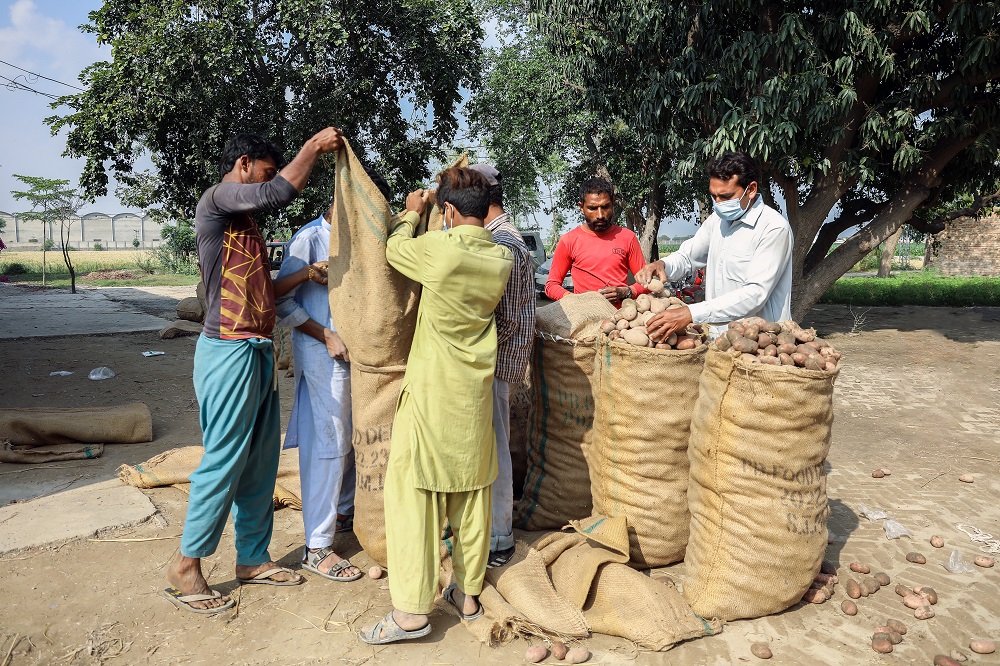
The Punjab province of Pakistan is one of the most important growing districts with over 95% of potato production originating from here. The crop is significantly valuable as a commodity for both farmers and consumers.
However, potato growers in Pakistan are facing major constraints in availability of healthy and certified seeds. Cultivation of poor-quality seeds further leads to low yields, attack of pest and diseases and high post-harvest losses.
The Times of India reports, for example, that potato growers in Punjab are facing a double blow with low prices for their crop and decreased yield. While potatoes are fetching about Rs 350-400 per quintal, onions, for instance, are fetching even less than Rs 300 per quintal.
Where high-quality seed costs roughly 35-50% of total production costs in Pakistan, most farmers relay on purchasing low-yielding varieties from unreliable input suppliers. Some smallholders also rely on their own seed.
Addressing hampered potato production
Furthermore, potato production is hampered due to improper use of fertilizers, devastating insect pests and diseases. CABI, though, is leading a project to help mitigate these pressures entitled ‘Capacity building of small-scale potato growers in Punjab, Pakistan.’
The project, funded by the Netherlands Enterprise Agency (RVO), is working to build the capacity of small-scale potato growers of Punjab on advanced potato production practices of seed and ware crop. It is doing this by providing information and skills to cultivate seed potato in the major potato growing areas of the province.
A team of trained master trainers, including women, are providing technical backstopping at every stage of crop production including sowing, till, and harvesting.
Hands-on training is being given to both male and female potato growers on advanced potato growing practices through a variety of methods which also include demonstration plots and farmers’ field days.
Self-sufficiency in seed production
Farmers lack the technical skill and knowledge to grow their own seed and the cost of the good quality seed is unbearable for smallholders.
The project team disseminated information on seed production technology as compared to traditional cultivation methods used by farmers. The team also provided technical assistance and extension support to them throughout the cropping season to produce their own seed.
Mr Skindar Hayat’s story
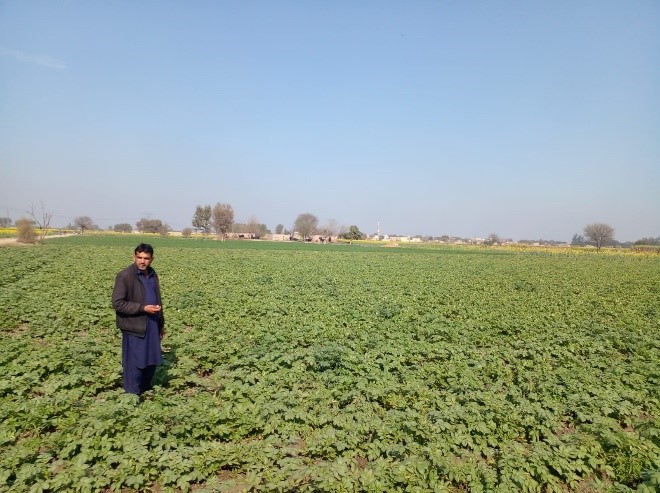
Mr Skindar Hayat is a small-scale potato grower of village 42-D, Depalpur, district Okara, with a landholding of around six acres. In the growing season 2021-2022, Mr Hayat joined the farmers’ training programme and established a demonstration plot on his land.
Mr Hayat said, “Prior to participating in CABI’s capacity building trainings, I lacked technical understanding about the selection of good quality seed and planting geometry.
“We did not use any specific planting distance for the seed crop to which we produced medium to large size tubers and a smaller number of marketable size tubers.
“In addition, I also had limited knowledge regarding the appropriate use of fertilisers, and integrated pest and disease management – all of which have significantly reduced my crop yield over the years.”
Importance of planting geometry
Mr Hayat said that after receiving technical knowledge and skills from the CABI team, he was more confident and able to understand the importance of the planting geometry.
Mr Hayat added, “This year, I have cultivated the potato seed crop on two acres by following the same production technology. I have planted good quality seed tubers with a planting distance of 17cm as recommended by the master trainers.
“I have also implemented the same fertilization and integrated pest management strategies disseminated by the CABI team. As such, I have produced good quality and the desired size of seed tubers.”
He also added that while some farmers in his area have suffered significant losses owing to severe frost injury, he has also learnt ways from the CABI team to avoid this on his crops.
““The seed produced with the advance production technology is high in demand but I have stored it for my own use.
“I appreciate the CABI team’s efforts to help me in becoming self-sufficient in potato seed production and also assisting my fellow farmers to reduce their cost of production,” Mr Hayat said.
Mr Amjad’s story
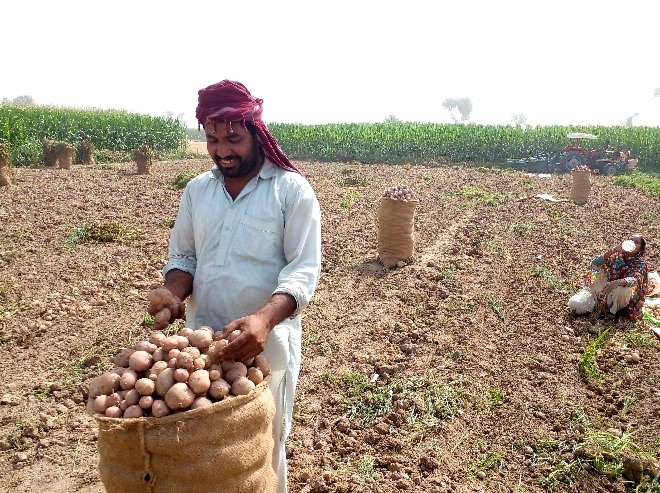
Mr Amjad lives in the village 187/9L, district Sahiwal. He is a small-scale potato grower who lacked access to affordable good-quality seed. He also established a demonstration plot on his land with the technical support of CABI and the Wageningen University & Research team in the growing season 2021-2022.
High yield achieved
Mr Amjad said, “I am a small-scale farmer and lack access to extension services. Before joining the capacity building programme, I had to purchase sub-standard seed from the local market. I attained low yields due to scab-affected seed tubers. I also lack the technical skills to produce my own seed.
“The CABI team planted good-quality seed of Asterix variety on the demonstration plot on my farm and I received training on seed selection, preparation and planting.
“The master trainers guided me about maintaining proper planting distance of 17 cm. I also applied the fertilizers according to the crop requirement and pesticides as suggested by the master trainer. My demonstration plot achieved a high yield and 90% of tubers are of marketable seed size (28-35 mm).”
Mr Amjad added that he now has the confidence to cultivate his own seed crop on an acre of land this year after following the advice of the master trainers.
“I store the harvested seed tubers in the cold storage facility. I kept them for upcoming cropping season and also shared some with my fellow farmers,” he said. “I am thankful to the CABI team for their technical support to achieve more self-reliance.”
Additional information
Main image: CABI is working to help build the capacity of small-scale potato growers of Punjab to grow more productive and profitable crops (Credit: CABI).
Project page
Find out more about CABI is increasing the productivity and sustainability of the potato smallholder sector in Punjab from project page here.
The project is being delivered in partnership with Agriculture Extension Department, Punjab, University of Agriculture Faisalabad, Pakistan Agriculture and Research Council (PARC) and Wageningen University & Research.
Authors
Ms Maila Al Saba Shah – Consultant
Yasar Saleem Khan – Provincial Team Manager
Dr Hafiz Mahmood Rehman – Research Officer/Leader in the Potato Value Chain
Dr Hassan Raza
Other relevant blogs
‘Sowing the seeds’ of better potato production in the Punjab.
Boosting socio-economic gender equity for smallholder potato farmers in Pakistan
Women and youth play key role in nutritional aspects of Pakistan’s potato value chain
1 Comment
Leave a Reply
Related News & Blogs
Strengthening the potato value chain in the Kurdistan Region of Iraq
On 30th May, we marked the International Day of Potato. In this blog, CABI’s Crop Health Advisor Anna Wood provides an update on a five-year project led by CABI to strengthen the potato value chain in the Kurdistan Region of Iraq. An ambitious five-yea…
3 June 2025

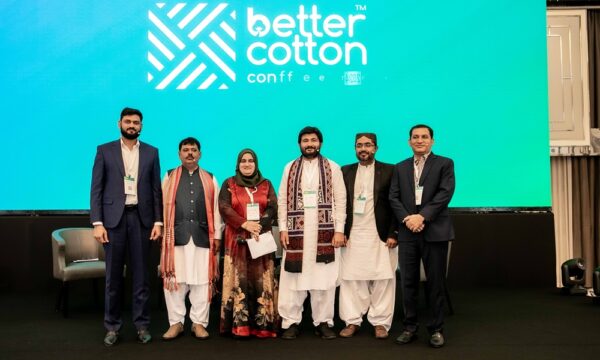


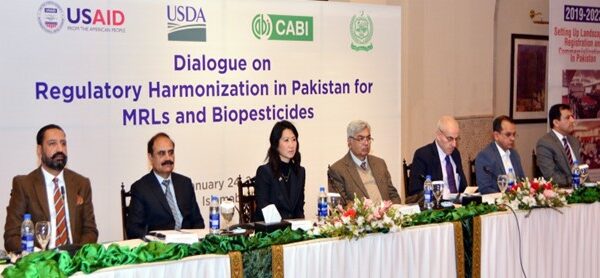
Basic agriculture student can apply for this internship?